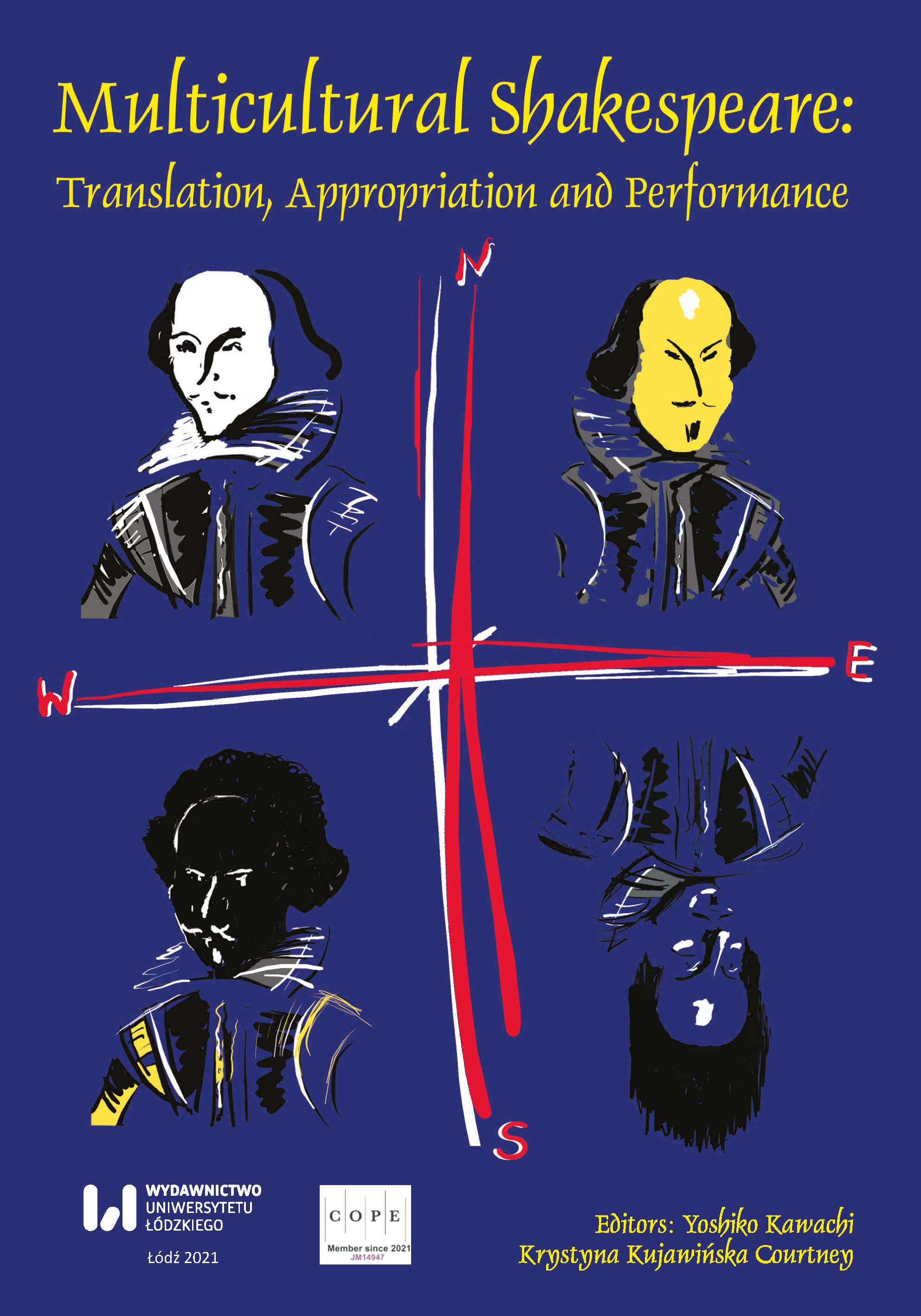From Social Justice to Metaphor: The Whitening of Othello in the Russian Imagination
DOI:
https://doi.org/10.18778/2083-8530.23.05Słowa kluczowe:
Othello, blackface, Russian theatre, Russian film, Soviet theatre, Soviet film, adaptation, translation, Sergei Iutkevich, Eldar Riazanov, Aleksei Zernov, Nikolai Koliada, Petr Gladilin, Vahram PapazianAbstrakt
Othello was the most often-staged Shakespeare play on early Soviet stages, to a large extent because of its ideological utility. Interpreted with close attention to racial conflict, this play came to symbolize, for Soviet theatres and audiences, the destructive racism of the West in contrast with Soviet egalitarianism. In the first decades of the twenty-first century, however, it is not unusual for Russian theatres to stage Othello as a white character, thus eliminating the theme of race from the productions. To make sense of the change in the Russian tradition of staging Othello, this article traces the interpretations and metatheatrical uses of this character from the early Soviet period to the present day. I argue that the Soviet tradition of staging Othello in blackface effectively prevented the use of the play for exploring the racial tensions within the Soviet Union itself, and gradually transformed the protagonist’s blackness into a generalized metaphor of oppression. As post-collapse Russia embraced whiteness as a category, Othello’s blackness became a prop that was entirely decoupled from race and made available for appropriation by ethnically Slavic actors and characters. The case of Russia demonstrates that staging Othello in blackface, even when the initial stated goals are those of racial equality, can serve a cultural fantasy of blackness as a versatile and disposable mask placed over a white face.
Pobrania
Bibliografia
Ackermann, A.S.E. Popular Fallacies Explained and Corrected. 3rd ed. London: The Old Westminster Press, 1923.
Google Scholar
Alpers, Boris. “Itogi teatral’nogo sezona (1935/36).” 1936. Teatral’nye ocherki. Vol. 2. Moscow: Iskusstvo, 1977: 312-320.
Google Scholar
Carlson, Marvin. The Haunted Stage: The Theatre as Memory Machine. Ann Arbor: The University of Michigan Press, 2001.
Google Scholar
DOI: https://doi.org/10.3998/mpub.17168
Collins, Kris. “White-washing the Black-a-moor: Othello, Negro Minstrelsy and Parodies of Blackness.” Journal of American Culture 19.3 (1996): 87-101.
Google Scholar
DOI: https://doi.org/10.1111/j.1542-734X.1996.1903_87.x
Daileader, Celia R. Racism, Misogyny, and the ‘Othello’ Myth: Inter-racial Couples from Shakespeare to Spike Lee. Cambridge: Cambridge University Press, 2005.
Google Scholar
Eichler, Maya. Militarizing Men: Gender, Conscription, and War in Post-Soviet Russia. Stanford: Stanford University Press, 2012.
Google Scholar
DOI: https://doi.org/10.1515/9780804778367
Gaydin, Boris. “Sergei Yutkevich’s Othello Revisited: A View from the 21st Century.” Znanie. Ponimanie. Umenie 4 (2018): 204-216.
Google Scholar
DOI: https://doi.org/10.17805/zpu.2018.4.20
Gnammankou, Dieudonné. “The Slave Trade to Russia.” In From Chains to Bonds: The Slave Trade Revisited. Ed. Doudou Diène. Paris: UNESCO Publishing, 2001: 65-73.
Google Scholar
Hirsch, Francine. Empire of Nations: Ethnographic Knowledge and the Making of the Soviet Union. Ithaca and London: Cornell University Press, 2005.
Google Scholar
DOI: https://doi.org/10.1353/imp.2005.0129
Hornback, Robert. Racism and Early Blackface Comic Traditions: From the Old World to the New. London: Palgrave Macmillan, 2018.
Google Scholar
DOI: https://doi.org/10.1007/978-3-319-78048-1
Iutkevich, Sergei. “‘Otello’, kakim ia ego uvidel.” In Kontrapunkt rezhissera. Moscow: Iskusstvo, 1960: 92-145.
Google Scholar
Koliada, Nikolai. Staraia zaichikha. Ural 8 (2006). Accessed through Zhurnalnyi Zal. https://magazines.gorky.media/ural/2006/8/staraya-zajchiha.html
Google Scholar
Kruti, I. “Sovetskii shekspirovskii teatr.” Sovetskoe iskusstvo 40, 21 April 1939: 2.
Google Scholar
Kujawinska Courtney, Krystyna. “Ira Aldridge, Shakespeare, and Color-Conscious Performances in Nineteenth-Century Europe.” In Colorblind Shakespeare: New Perspectives on Race and Performance. Ed. Ayanna Thompson. New York: Routledge, 2006: 103-122.
Google Scholar
Martin, Terry. The Affirmative Action Empire: Nations and Nationalism in the Soviet Union, 1923-1939. Ithaca: Cornell University Press, 2001.
Google Scholar
DOI: https://doi.org/10.7591/9781501713323
Menzer, Paul. Anecdotal Shakespeare: A New Performance History. London: Bloomsbury, 2015.
Google Scholar
Mordvinov, Nikolai. Dnevniki, 1938-1966. Moscow: VTO, 1976. Accessed through Prozhito. The European University at St. Petersburg. https://prozhito.org/notes?date=%221945-01-01%22&diaries=%5B44%5D
Google Scholar
Novikova, Irina. “Imagining Africa and Blackness in the Russian Empire: From Extratextual Arapka and Distant Cannibals to Dahomey.” Social Identities 19.5 (2013): 571-591.
Google Scholar
DOI: https://doi.org/10.1080/13504630.2013.810122
“Otello.” Satirikon. https://www.satirikon.ru/performance/repertoire/otello/ [Accessed on 23 December 2020].
Google Scholar
Papazian, Vahram. “O sebe.” Sovremennyi teatr 21, 22 May 1928: 417.
Google Scholar
Papazian, Vahram. Po teatram mira. Ed. and intro Evgenii Kuznetsov. Leningrad/Moscow: Iskusstvo, 1937.
Google Scholar
Roman, Meredith L. “Making Caucasians Black: Moscow Since the Fall of Communism and the Racialization of Non-Russians.” Journal of Communist Studies and Transition Politics 18.2 (2002): 1-27.
Google Scholar
DOI: https://doi.org/10.1080/714003604
Romantsova, Olga. “Vo vsem vinovaty zhenshchiny.” Expert, 13 March 2000. https://expert.ru/expert/2000/10/10ex-novkult3_24087/
Google Scholar
Rosliakova, Svetlana. “Za shtorkoi stoial belyi Otello.” Grand Express 2, 9-16 January 2013. http://mail.grandex27.ru/paper/473/7370/
Google Scholar
Ruskin, John. Ruskin’s Venetian Notebooks 1849-50. Vol. 10, Stones of Venice, vol. II. Eds. Ian Bliss, Roger Garside, and Ray Haslam. Lancaster University. 2008. https://www.lancaster.ac.uk/fass/ruskin/eSoV/
Google Scholar
Shakespeare, William. Othello. 3rd ed. Ed. E.A.J. Honigmann. 1997. London: Arden Shakespeare, 2001.
Google Scholar
Siemon, James R. “‘Nay, that’s not next’: Othello, V.ii in Performance, 1760-1900.” Shakespeare Quarterly 37.1 (1986): 38-51.
Google Scholar
DOI: https://doi.org/10.2307/2870190
Simonyan, Margarita. Twitter post. 30 November 2020. https://twitter.com/M_Simonyan/status/1333432276877774850 [Accessed on 20 December 2020].
Google Scholar
Smith, Ian. “Othello’s Black Handkerchief.” Shakespeare Quarterly 64.1 (2013): 1-25.
Google Scholar
DOI: https://doi.org/10.1353/shq.2013.0017
Thompson, Ayanna. “The Blackfaced Bard: Returning to Shakespeare or Leaving Him?” Shakespeare Bulletin 27.3 (2009): 437-456.
Google Scholar
DOI: https://doi.org/10.1353/shb.0.0103
“V novom ‘Otello’ Teatra na Taganke rasovyi konflikt otsutstvuet, a Iago igraet zhenshchina.” Moskvich Mag, 12 November 2020. https://moskvichmag.ru/gorod/v-novom-otello-teatra-na-taganke-rasovyj-konflikt-otsutstvuet-a-yago-igraet/
Google Scholar
“V TIUZE novyi ‘Otello’.” Vecherniaia Kazan’, 1 February 2011. http://www.evening-kazan.ru/articles/v-tyuze-novyy-otello.html
Google Scholar
Zakharov, Nikolay. Race and Racism in Russia. Palgrave Macmillan: Basingstoke, 2015.
Google Scholar
DOI: https://doi.org/10.1057/9781137481207
Pobrania
Opublikowane
Jak cytować
Numer
Dział
Licencja

Utwór dostępny jest na licencji Creative Commons Uznanie autorstwa – Użycie niekomercyjne – Bez utworów zależnych 4.0 Międzynarodowe.












